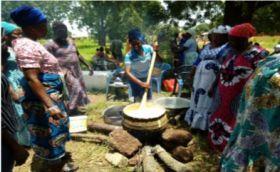
In the 18 months since Rashida Baka was awarded a place on the Marshal Papworth Fund’s short course agricultural scholarship, she has already positively impacted the lives of over 700 men and women in her community in Ghana, while empowering women with increased income and access to training.
Baka explained: “The career progression that I have been able to make and my new sustainable farming methods from this scholarship has directly led to farmers in my districts growing more food, while women in farming have been able to double their income. Crucially for me, the gender pay gap in farming in my district has reduced and 350 women in the last 12 months alone were educated in disease control, while 40 per cent of women are now involved in vegetable production for household use and commercial markets.
One example of the changes Baka has made as a result of her Marshal Papworth scholarship is that 500 members of Village Savings and Loans Associations (VSLA) have benefited from her training on soya bean and vegetable production, and as a result of their increased productivity, 20 of those members have gone on to be introduced to viable markets for their produce and increased their weekly income.
Baka has also had a decisive impact on nutrition in her local community, where she has trained 200 school caterers on nutrition and soya bean use across two districts. Within the education sector, she has also been able to set-up 25 demonstration fields for farmers to learn best practice and farm in a more sustainable and productive way.
The personal benefits to Rashida’s career have been clear too, with a promotion to technical agricultural adviser within her organisation - agroforestry charity Tree Aid - while stronger communication skills picked up on the Marshal Papworth course have enabled closer collaboration with the Ministry of Food and Agriculture (MoFA) in Ghana. As a result, she has also trained 12 Agricultural Extension Officers for MoFA to further spread the sustainable farming methods.
Baka's own agricultural productivity has risen too: “This year for instance, I have increased my number of acres from four acres to 10, and I am expecting over 95 per cent increase in the yield due to the good practices applied. The number of communities currently benefiting from demonstration fields has doubled and this is expected to further increase by over 70 per cent due to the high demand for training. I find demonstration plots work really well as farmers are able to learn and replicate the practices on their farms easily, quickly bringing about an increase in yields.”
Through the agricultural charity’s specially designed programme, Baka spent an intensive 10-week period in the UK, learning practical and theoretical skills to support sustainable farming in developing countries, covering vegetable, cereals and livestock production, as well as water and tree conservation, and methods to mitigate the effects of climate change.



